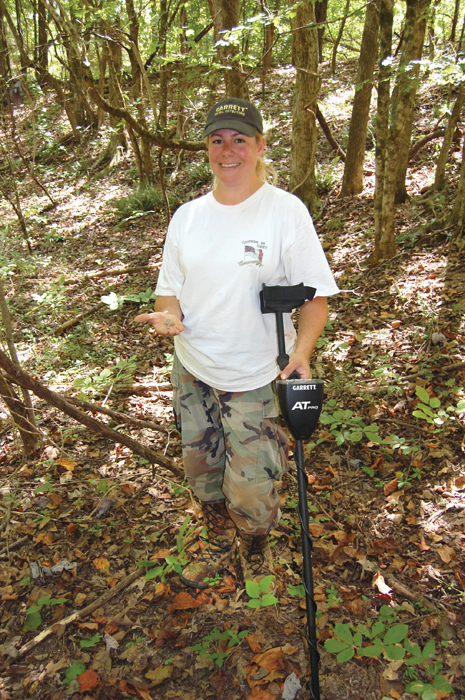<p style="text-align: justify;"><strong>Robert E. Lee, Ulysses S. Grant, Jefferson Davis&#8230; </strong></p>
<h4 style="text-align: justify;"><em><strong>If These Names Excite You, Try Civil War Relic Hunting</strong></em></h4>
<p style="text-align: justify;">Researching our local towns can be an exciting way to connect to history. From adults to children, the excitement of learning can be shared by all. While just starting out with a metal detector, people tend to search for any target they can find. Then, as they get familiar with their equipment—they veer off into specialized areas of detecting. Some detetorists love going after coins, others enjoy beach hunting; and others are strictly interested in finding relics from the past. Relic hunting is a broad category that can be further classified. For instance, Revolutionary War, Spanish American War or Civil War relic hunting. The Civil War was fought between 1861 and 1865—so prized items from this time period include guns, bayonets, canteens, bullets and other artifacts of warfare. Most Civil War relics can be found at the sites of old battlefields and campgrounds. In order to determine the coordinates of these centuries-ago places, research is absolutely the key ingredient. Civil War relic hunting experts say they have looked through books from libraries all over the country in order to find Civil War campgrounds.</p>
<p style="text-align: justify;">One Civil War relic hunter was able to get his hands on a collection of Civil War officers’ records which contains specific information about where Union and Confederate forces camped between battles. The records deal mainly with Oklahoma and the surrounding states. He has amassed an array of valuable Minie balls, belt plates, buckles and buttons. The resounding consensus among relic hunters is to focus on one specific area of a state in which Civil War battles were fought. Terry Waxham, a successful Civil War relic hunter based in Shreveport, Louisiana, has focused his research and attention on the vicinity of Shreveport. Today, he and his family have assembled one of the most complete collections of relics relating to this part of the country. Several Louisiana museums and libraries are even interested in his collection!</p>
<h4 style="text-align: justify;"><strong>Now You’ve Done the Research and Found a Location… Now What?</strong></h4>
<p style="text-align: justify;">As a Civil War buff, you undoubtedly know a thing or two about where battles were fought—perhaps there are sites to hunt in your own state. If not, it would be fun to plan a trip around relic hunting. Check Google Maps and other battle maps you can find. Once you have decided where you will search for a Civil War campground, there are tactics you can use to further pinpoint the area. One of them is using different sized search coils on your metal detector. When you are first at the site, a 10 ½&#8221; coil can be used to find larger relics and isolate your searching area. After finding the general perimeter of the camp, a smaller 8” search coil will target smaller items such as coins, buttons and bullets. Expert detectorists also advise using headphones—they help pinpoint smaller relics you may detect. Metal detecting digging tools are ideal for carefully removing hard-packed soil and cutting through roots and other obstacles.</p>
<p style="text-align: justify;">If you’ve never operated a metal detector before, here’s good news: many of them are “turn on and go.” This means that the settings are automated so there are no complicated adjustments to make. Obviously, all metal detectors come with an instruction manual. This way, if you are interested in changing settings or more advanced features, you have the option.</p>
<h4 style="text-align: justify;"><strong>Which Type of Metal Detector Targets Relics?</strong></h4>
<p style="text-align: justify;">There are a few things to consider when purchasing a metal detector for relic hunting. The first is- what type of soil are you hunting? Many of the best spots for relic hunting are in heavily mineralized areas (the south, for example is known for red clay). Metal detectors will pick up minerals in the soil and produce false signals. Metal detectors with ground adjust or ground balance control will allow you to filter out the interference from the minerals while still maintaining sensitivity to target relics.</p>
<p style="text-align: justify;">The frequency of your metal detector is also important when it comes to relic hunting. Many relics are produced from iron, brass and steel. These lower conductivity items can be difficult to locate with the wrong frequency. A VLF (Very Low Frequency) detector or at least a lower frequency—will be able to detect relics better than a model with a high frequency. A great article on relic metal detectors to read when you’re selecting a metal detector for Civil War relic hunting is: &#8220;Best Metal Detectors for Finding Relics.&#8221; In this article you will learn about the best entry-level, mid-level and high-end relic hunting metal detectors for finding relics.</p>
<h5 style="text-align: justify;">Featured images:</h5>
<ul style="text-align: justify;">
<li><span class="license">License: Image author owned</span></li>
</ul>
<p style="text-align: justify;"><strong>Biography</strong></p>
<p style="text-align: justify;">About the author: Daniel Bernzweig manages MetalDetector.com in Southborough, MA. He has written on the subject of treasure hunting and metal detecting since the mid 1980’s. He enjoys traveling with his metal detector and helping to educate others in the correct use of metal detectors in their explorations.</p>

A New Way To Discover Local History
